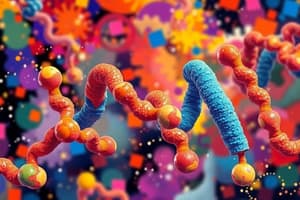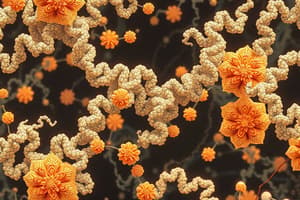Podcast
Questions and Answers
What is the primary role of proteins in living organisms?
What is the primary role of proteins in living organisms?
- They assist in the elimination of waste products.
- They form the fundamental basis of structure and function of life. (correct)
- They store genetic information.
- They serve as the primary energy source.
Which statement accurately describes proteins?
Which statement accurately describes proteins?
- Proteins constitute about 25% of the cellular dry weight.
- Proteins are nitrogenous macromolecules made of amino acids. (correct)
- Proteins are inorganic compounds essential for life.
- Proteins are composed solely of fatty acids.
Who first suggested the name 'proteins' for the important group of organic compounds?
Who first suggested the name 'proteins' for the important group of organic compounds?
- G.J. Mulder
- Linus Pauling
- Berzelius (correct)
- Charles Darwin
What significant finding did G.J. Mulder report in 1839 regarding certain substances?
What significant finding did G.J. Mulder report in 1839 regarding certain substances?
What does the term 'proteios', which is the origin of the word protein, mean?
What does the term 'proteios', which is the origin of the word protein, mean?
Flashcards
Proteins
Proteins
Large, complex molecules made up of many amino acids linked together.
Location and Abundance of Proteins
Location and Abundance of Proteins
Proteins are found in every part of a cell and make up about 50% of its dry weight.
Functions of Proteins
Functions of Proteins
Proteins have a wide range of functions in the body, including providing structure, facilitating chemical reactions, and transporting molecules.
Amino Acid Chains
Amino Acid Chains
Signup and view all the flashcards
Origin of the Term 'Protein'
Origin of the Term 'Protein'
Signup and view all the flashcards
Study Notes
Proteins: Introduction
- Proteins are the most abundant organic molecules in living systems.
- They are found throughout the cell and account for about 50% of cellular dry weight.
- Proteins are fundamental to life's structure and function.
Historical Context
- In 1839, Dutch chemist G.J. Mulder, studying substances like milk and egg proteins, discovered their coagulability with heat and their nitrogenous nature.
- The term "protein" comes from the Greek word "proteios," meaning "first."
- Swedish chemist Berzelius proposed the name "protein" for this crucial group of organic compounds.
Composition
- Proteins are nitrogenous macromolecules.
- They are composed of multiple amino acids.
Studying That Suits You
Use AI to generate personalized quizzes and flashcards to suit your learning preferences.




